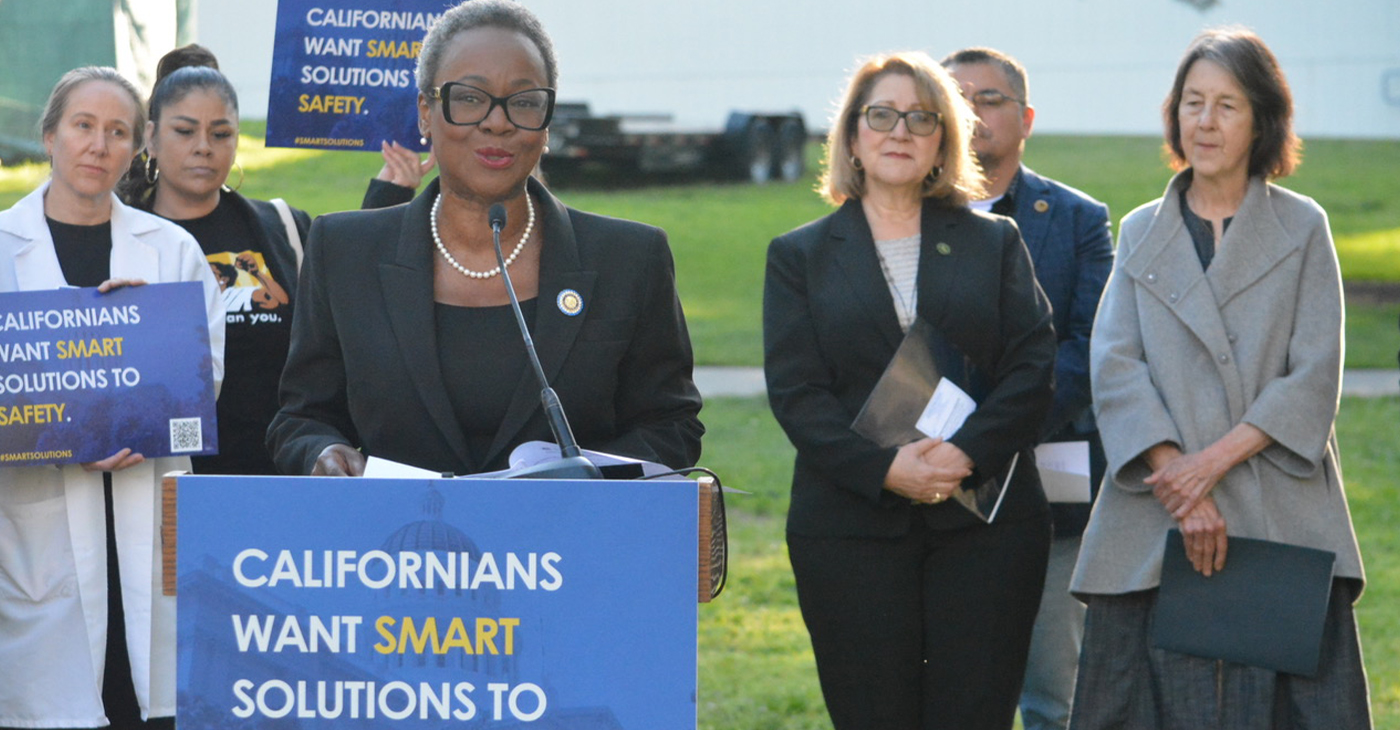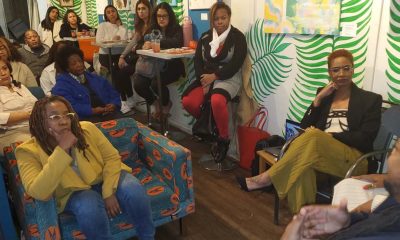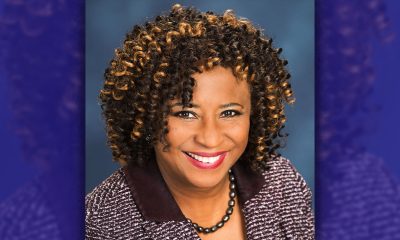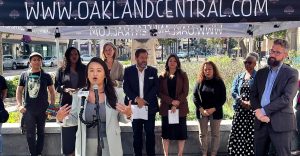Health
Paid to Sleep: NY Cracks Down on Napping Health Workers

MICHAEL VIRTANEN, Associated Press
ALBANY, N.Y. (AP) — By day, Tanya Lemon was a 35-year-old single mother who took care of her four children. By night, she worked 12-hour shifts as a nurse at a state group home in suburban Syracuse, paid to watch over vulnerable residents as they slept.
That’s also when she got her own sleep, prosecutors say — a routine that led to felony charges when Dennis Dattalo, a 25-year-old disabled man who couldn’t speak, ran low on oxygen while on her watch and later died.
The case has brought renewed attention in New York to the problem of fatigue among health care workers — and in particular highlights the low-paid nurses, aides and others who care for vulnerable people at night, when sleeping can all too often become part of the job.
Nurse Barbara Parsons worked with Lemon at the Briarwood Lane home in DeWitt, making $34,000 a year. Some staff, she said, signed up for extra shifts to get overtime pay and would shave a half-hour off second shifts to avoid rules limiting work hours. Sleeping on night shifts was common knowledge.
“She wasn’t the only one,” Parsons said. “Everybody knew it.”
While health workers who willfully sleep on the job — as opposed to nodding off or making errors because of fatigue — are more often disciplined or terminated, Lemon’s case last spring fired up prosecutors and invigorated a push by regulators in New York.
New York’s Justice Center for the Protection of People with Special Needs, established in mid-2013 with oversight of six state agencies responsible for more than a million people in direct state care or state-funded nonprofits, identified 458 reports alleging abuse or neglect from its first year that cited sleeping on the job. An additional 64 were classified as “significant incidents,” with potential to harm someone’s health, safety or welfare.
The center in December issued guidance to agencies, caregivers and families statewide in the effort to detect and deter the problem.
Statistics on the number of prosecutions of sleeping health workers are scant; several states contacted by The Associated Press said they don’t track such cases. But judging by the number of cases of sleeping in New York and Ohio, the problem is fairly widespread.
In Ohio Last year, the Department of Developmental Disabilities substantiated 88 instances in which paid caregivers slept on the job. Many happened on overnight shifts, when individuals in their care were asleep. No harm came about, and no law enforcement action was taken.
New York’s guidance on the fatigue problem cited five specific cases of developmentally disabled, mentally ill, drug-addicted and juvenile clients in state homes, all considered vulnerable and needing supervision. One had an unattended seizure. Another, with a tendency to choke, was eating alone at night. Others helped themselves to unlocked medications. One ran away. Six were in a vehicle when their caregiver fell asleep and crashed.
Patricia Gunning, the special prosecutor for New York’s Justice Center for disabled people, led the case against Lemon. She draws a sharp distinction between fatigue or nodding off and deliberate sleeping.
“Willful sleeping on the job is something that rises to criminal conduct,” Gunning said. Her office is investigating another possible criminal case. If they can prove supervisors knew about sleeping and looked the other way, at the Briarwood Lane home or any others, they’ll also be prosecuted, she said.
According to authorities, Lemon was supposed to check on Dattalo every two hours to ensure he was getting enough supplemental oxygen from a mask and to keep his airway clear. For eight hours he wasn’t checked, suffered brain damage from oxygen deprivation and was taken to a hospital, where he died 14 days later.
Lemon pleaded guilty to felony endangerment of a disabled person, was sentenced to 90 days in jail and five years’ probation, lost her nursing license, and is barred from working with individuals New York considers vulnerable.
Advocates for health workers like Lemon note that they work a tough job at a trying schedule for low pay, and have called for raises for what they say is important and underappreciated work caring for people who can’t care for themselves.
Lemon’s attorney, Jeffrey DeRoberts, said she has taken responsibility and is returning to school to learn to drive a truck, and he also noted case information indicated napping on overnight shifts was “not unusual” at Briarwood Lane.
“She was doing the best she could,” he said.
___
Online:
Report from New York’s Justice Center for the Protection of People with Special Needs:
http://on.ny.gov/1F9rs4H
Copyright 2015 The Associated Press. All rights reserved. This material may not be published, broadcast, rewritten or redistributed.
Antonio Ray Harvey
Sacramento Lawmakers Step Up Push for “Smart Solutions” on Crime, Public Safety
Assemblymember Tina McKinnor (D-Inglewood) and Sen. Lola Smallwood-Cuevas (D-Ladera Heights), both members of the California Legislative Black Caucus (CLBC), have joined other lawmakers and criminal justice reform advocates to address public safety in the state. On April 2, CLBC members gathered outside the State Capitol for the unveiling of the #SmartSolutions Public Safety Policy Platform, a package of 30 bills that addresses the top concerns of retailers, retail workers, the fentanyl crisis, and support for victims and survivors of crime.

By Antonio Ray Harvey, California Black Media
Assemblymember Tina McKinnor (D-Inglewood) and Sen. Lola Smallwood-Cuevas (D-Ladera Heights), both members of the California Legislative Black Caucus (CLBC), have joined other lawmakers and criminal justice reform advocates to address public safety in the state.
On April 2, CLBC members gathered outside the State Capitol for the unveiling of the #SmartSolutions Public Safety Policy Platform, a package of 30 bills that addresses the top concerns of retailers, retail workers, the fentanyl crisis, and support for victims and survivors of crime.
“Instead of being tough on crime, we need to be smart on crime,” Smallwood said at the press briefing. “I am not saying that we’re not going to be holding folks accountable for the actions that they take. But we will not rely on incarceration as a solution.”
McKinnor, Smallwood-Cuevas, a coalition of advocates, addiction treatment experts, and Yurok Tribal leaders joined Sen. Nancy Skinner (D-Berkeley), and Assemblymember Eloise Gómez Reyes (D-Colton) at the press conference organized to promote legislative solutions that ensure safety and justice.
Organizers say #SmartSolutions is an intersectional campaign that combats criminalization and mass incarceration by pushing for the redirection of state resources to fund housing, health care, schools, services for victims, and programs that reduce recidivism and promote accountability, beyond incarceration.
Opponents of the bills proposed in the #SmartSolutions campaign say their colleagues who support reform-focused strategies are looking the other way on crime and encouraging lawlessness.
For example, Assemblymembers Wendy Carillo (D-Boyle Heights), Carlos Villapudua (D-Stockton) and Mike Gipson (D-Carson) are supporting Assembly Bill (AB) 1990, legislation that would allow a peace officer to arrest shoplifters without a warrant or without witnessing the theft.
Assemblymember James Ramos (D-Highland) authored AB 1772 and introduced it in January. The legislation proposes sterner penalties for retail theft, particularly for repeat offenders.
The #SmartSolutions campaign is co-sponsored by Ella Baker Center for Human Rights, Smart Justice California, American Civil Liberties Union (ACLU) California Action, Californians for Safety and Justice, and Californians United for a Responsible Budget (CURB).
Smallwood recently introduced two bills she hopes will provide solutions to the escalating retail theft problem in the state. Senate Bill (SB) 1446 addresses theft, technology and job security in retail establishments and aims to minimize workplace violence, according to supporters. SB 1282 requires counties to expand the use of a diversion program for theft cases.
“Restorative Justice is the essential pillar of making our criminal justice system more fair, just, and equitable,” McKinnor said. “Restorative justice recognizes the trauma of victims and preparatory of crimes and provides a constructive space for victims to find healing.”
Dr. Amiee Moulin, founder of the California Bridge program and chief of the Division of Addiction Medicine at the University of California (UC) Medical Center, said drug “addiction and overdose” are taking a toll on patients, families and the community.
“I believe that California’s proposed legislation focused on expanding access to treatment is a crucial step towards saving lives,” Moulin said. “By removing barriers to care and embracing evidenced-based strategies we can provide patients the support they need to heal and recover.”
California Black Media
Stakeholders Warn Lawmakers of Expanding Aging Population; Older Black Californians Included
The California Commission on Aging (CCoA) hosted its second annual forum focused on challenges facing Californians over 65 years old. Titled “Aging and Disability Issues: What Legislative Staff Need to Know for 2024,” the virtual event was organized to bring awareness to lawmakers that California’s aging adults are living longer and to emphasize the importance of developing policy to support this growing population, according to organizers.

By Antonio Ray Harvey, California Black Media
The California Commission on Aging (CCoA) hosted its second annual forum focused on challenges facing Californians over 65 years old.
Titled “Aging and Disability Issues: What Legislative Staff Need to Know for 2024,” the virtual event was organized to bring awareness to lawmakers that California’s aging adults are living longer and to emphasize the importance of developing policy to support this growing population, according to organizers.
This year’s meeting included the perspectives of gerontologists and other subject-matter experts who provided data and insights critical to informing policy.
Former Assemblymember Cheryl Brown (D-San Bernardino), who chairs the CCoA’s Executive Committee, began the discussion.
“The landscape of California is changing. Aging is changing and it’s changing California,” Brown said. “Older adults are living longer, and the cohort is becoming more ethnically diverse, underscoring the need to develop culturally, appropriate services.”
The discussion encompassed a range of topics including planning for long-term care, assisted living, enhancing healthcare quality, technology use, services for senior adults with disabilities, state budget considerations, and the best policies and practices to help aging adults stay healthy, active, independent, and confident.
The CCoA acts as the principal advocate for older Californians and as a catalyst for change that supports and celebrates Californians as they advance in age. The CCoA advises the Governor and Legislature, along with state, federal, and local agencies on programs and services that affect senior adults.
Statewide organizations that participated in the event included LeadingAge California, Disability Rights California, California Foundation for Independent Living Centers, and California Collaborative for Long-Term Services and Supports.
In addition, representatives and staff members of Choice In Aging, Age Watch Newsletter, California Elder Justice Coalition, California Association of Area Agencies on Aging, and the California Long-Term Care Ombudsman Association were presenters during the 90-minute discussion.
“In California, we know that older adults are underserved and unserved relative to their needs,” CCoA Executive Director Karol Swartzlander said. “In stark terms, we know that 4% of older adults who need service actually receive services.”
According to the California Department of Aging (CDA), California’s aging population is expected to reach an estimated 4.5 million individuals ages 60 to 69 and 4.2 million senior adults ages 70- to 79 by the year 2040, based on information from CDA’s Master Plan for Aging.
Recognizing that the state’s 65-plus population is projected to grow to 8.6 million by 2030, Gov. Gavin Newsom issued an executive order calling for the development of the MPA.
Debbie Toth, from ChoiceInAging, said the MPA is a model of “how we can do better” to service the needs of older adults. ChoiceInAging, Toth said, “is going to be shopping accessible transportation and rate increases for adult day healthcare.
“But we need to have legislation to do it,” Toth told legislative staff members.
A 2016 California Health Report (CHR) revealed that by 2030, 18% of the state will be 65 or older. Projections in that study also indicated that 52% of these older adults would be from diverse minority groups but “no population is expected to be harder hit than African Americans,” the report stated.
California Black Media
Asm. Akilah Weber Introduces Bill to Protect Terminally Ill Californians
On Feb. 7, Assemblymember Akilah Weber (D-La Mesa) introduced legislation, Assembly Bill (AB) 2180, designed to ensure that terminally or chronically ill people living in California can afford their life-saving medications.
If passed, the law would require California health plan providers, insurers and pharmacy benefit managers (PBMs) to count the value of financial assistance provided by subsidy programs towards a terminally ill patient’s deductible and out-of-pocket expenses.

By California Black Media
On Feb. 7, Assemblymember Akilah Weber (D-La Mesa) introduced legislation, Assembly Bill (AB) 2180, designed to ensure that terminally or chronically ill people living in California can afford their life-saving medications.
If passed, the law would require California health plan providers, insurers and pharmacy benefit managers (PBMs) to count the value of financial assistance provided by subsidy programs towards a terminally ill patient’s deductible and out-of-pocket expenses.
“When insurers and PBMs do onto count the value of copay assistance toward cost-sharing requirements, patients often experience “a copay surprise” at the pharmacy counter and may be forced to walk away without their needed medication because they cannot afford it,” wrote Weber in a statement.
Over 80 patient advocacy organizations, medical foundations and other groups applauded Weber for introducing the legislation.
“The All Copays Count in California Coalition commends Dr. Weber for championing legislation that will improve patient access to medications and protect the most vulnerable Californians from harmful and deceptive insurance schemes that raise patient costs,” said Lynne Kinst, Executive Director of Hemophilia Council of California (HCC), which is a cosponsor of the bill.
According to the HCC, an estimated 70% of patients “abandon their prescription medications when their out-of-pocket costs reach $250 or more.
-

 Activism4 weeks ago
Activism4 weeks agoOakland Post: Week of March 20 – 26, 2024
-

 #NNPA BlackPress3 weeks ago
#NNPA BlackPress3 weeks agoCOMMENTARY: D.C. Crime Bill Fails to Address Root Causes of Violence and Incarceration
-

 #NNPA BlackPress3 weeks ago
#NNPA BlackPress3 weeks agoMayor, City Council President React to May 31 Closing of Birmingham-Southern College
-

 #NNPA BlackPress3 weeks ago
#NNPA BlackPress3 weeks agoFrom Raids to Revelations: The Dark Turn in Sean ‘Diddy’ Combs’ Saga
-

 #NNPA BlackPress3 weeks ago
#NNPA BlackPress3 weeks agoCOMMENTARY: Lady Day and The Lights!
-

 #NNPA BlackPress3 weeks ago
#NNPA BlackPress3 weeks agoBaltimore Key Bridge Catastrophe: A City’s Heartbreak and a Nation’s Alarm
-

 #NNPA BlackPress3 weeks ago
#NNPA BlackPress3 weeks agoBaltimore’s Key Bridge Struck by Ship, Collapses into Water
-

 Activism3 weeks ago
Activism3 weeks agoOakland Post: Week of March 27 – April 2, 2024
Health
Paid to Sleep: NY Cracks Down on Napping Health Workers

MICHAEL VIRTANEN, Associated Press
ALBANY, N.Y. (AP) — By day, Tanya Lemon was a 35-year-old single mother who took care of her four children. By night, she worked 12-hour shifts as a nurse at a state group home in suburban Syracuse, paid to watch over vulnerable residents as they slept.
That’s also when she got her own sleep, prosecutors say — a routine that led to felony charges when Dennis Dattalo, a 25-year-old disabled man who couldn’t speak, ran low on oxygen while on her watch and later died.
The case has brought renewed attention in New York to the problem of fatigue among health care workers — and in particular highlights the low-paid nurses, aides and others who care for vulnerable people at night, when sleeping can all too often become part of the job.
Nurse Barbara Parsons worked with Lemon at the Briarwood Lane home in DeWitt, making $34,000 a year. Some staff, she said, signed up for extra shifts to get overtime pay and would shave a half-hour off second shifts to avoid rules limiting work hours. Sleeping on night shifts was common knowledge.
“She wasn’t the only one,” Parsons said. “Everybody knew it.”
While health workers who willfully sleep on the job — as opposed to nodding off or making errors because of fatigue — are more often disciplined or terminated, Lemon’s case last spring fired up prosecutors and invigorated a push by regulators in New York.
New York’s Justice Center for the Protection of People with Special Needs, established in mid-2013 with oversight of six state agencies responsible for more than a million people in direct state care or state-funded nonprofits, identified 458 reports alleging abuse or neglect from its first year that cited sleeping on the job. An additional 64 were classified as “significant incidents,” with potential to harm someone’s health, safety or welfare.
The center in December issued guidance to agencies, caregivers and families statewide in the effort to detect and deter the problem.
Statistics on the number of prosecutions of sleeping health workers are scant; several states contacted by The Associated Press said they don’t track such cases. But judging by the number of cases of sleeping in New York and Ohio, the problem is fairly widespread.
In Ohio Last year, the Department of Developmental Disabilities substantiated 88 instances in which paid caregivers slept on the job. Many happened on overnight shifts, when individuals in their care were asleep. No harm came about, and no law enforcement action was taken.
New York’s guidance on the fatigue problem cited five specific cases of developmentally disabled, mentally ill, drug-addicted and juvenile clients in state homes, all considered vulnerable and needing supervision. One had an unattended seizure. Another, with a tendency to choke, was eating alone at night. Others helped themselves to unlocked medications. One ran away. Six were in a vehicle when their caregiver fell asleep and crashed.
Patricia Gunning, the special prosecutor for New York’s Justice Center for disabled people, led the case against Lemon. She draws a sharp distinction between fatigue or nodding off and deliberate sleeping.
“Willful sleeping on the job is something that rises to criminal conduct,” Gunning said. Her office is investigating another possible criminal case. If they can prove supervisors knew about sleeping and looked the other way, at the Briarwood Lane home or any others, they’ll also be prosecuted, she said.
According to authorities, Lemon was supposed to check on Dattalo every two hours to ensure he was getting enough supplemental oxygen from a mask and to keep his airway clear. For eight hours he wasn’t checked, suffered brain damage from oxygen deprivation and was taken to a hospital, where he died 14 days later.
Lemon pleaded guilty to felony endangerment of a disabled person, was sentenced to 90 days in jail and five years’ probation, lost her nursing license, and is barred from working with individuals New York considers vulnerable.
Advocates for health workers like Lemon note that they work a tough job at a trying schedule for low pay, and have called for raises for what they say is important and underappreciated work caring for people who can’t care for themselves.
Lemon’s attorney, Jeffrey DeRoberts, said she has taken responsibility and is returning to school to learn to drive a truck, and he also noted case information indicated napping on overnight shifts was “not unusual” at Briarwood Lane.
“She was doing the best she could,” he said.
___
Online:
Report from New York’s Justice Center for the Protection of People with Special Needs:
http://on.ny.gov/1F9rs4H
Copyright 2015 The Associated Press. All rights reserved. This material may not be published, broadcast, rewritten or redistributed.
Antonio Ray Harvey
Sacramento Lawmakers Step Up Push for “Smart Solutions” on Crime, Public Safety
Assemblymember Tina McKinnor (D-Inglewood) and Sen. Lola Smallwood-Cuevas (D-Ladera Heights), both members of the California Legislative Black Caucus (CLBC), have joined other lawmakers and criminal justice reform advocates to address public safety in the state. On April 2, CLBC members gathered outside the State Capitol for the unveiling of the #SmartSolutions Public Safety Policy Platform, a package of 30 bills that addresses the top concerns of retailers, retail workers, the fentanyl crisis, and support for victims and survivors of crime.

By Antonio Ray Harvey, California Black Media
Assemblymember Tina McKinnor (D-Inglewood) and Sen. Lola Smallwood-Cuevas (D-Ladera Heights), both members of the California Legislative Black Caucus (CLBC), have joined other lawmakers and criminal justice reform advocates to address public safety in the state.
On April 2, CLBC members gathered outside the State Capitol for the unveiling of the #SmartSolutions Public Safety Policy Platform, a package of 30 bills that addresses the top concerns of retailers, retail workers, the fentanyl crisis, and support for victims and survivors of crime.
“Instead of being tough on crime, we need to be smart on crime,” Smallwood said at the press briefing. “I am not saying that we’re not going to be holding folks accountable for the actions that they take. But we will not rely on incarceration as a solution.”
McKinnor, Smallwood-Cuevas, a coalition of advocates, addiction treatment experts, and Yurok Tribal leaders joined Sen. Nancy Skinner (D-Berkeley), and Assemblymember Eloise Gómez Reyes (D-Colton) at the press conference organized to promote legislative solutions that ensure safety and justice.
Organizers say #SmartSolutions is an intersectional campaign that combats criminalization and mass incarceration by pushing for the redirection of state resources to fund housing, health care, schools, services for victims, and programs that reduce recidivism and promote accountability, beyond incarceration.
Opponents of the bills proposed in the #SmartSolutions campaign say their colleagues who support reform-focused strategies are looking the other way on crime and encouraging lawlessness.
For example, Assemblymembers Wendy Carillo (D-Boyle Heights), Carlos Villapudua (D-Stockton) and Mike Gipson (D-Carson) are supporting Assembly Bill (AB) 1990, legislation that would allow a peace officer to arrest shoplifters without a warrant or without witnessing the theft.
Assemblymember James Ramos (D-Highland) authored AB 1772 and introduced it in January. The legislation proposes sterner penalties for retail theft, particularly for repeat offenders.
The #SmartSolutions campaign is co-sponsored by Ella Baker Center for Human Rights, Smart Justice California, American Civil Liberties Union (ACLU) California Action, Californians for Safety and Justice, and Californians United for a Responsible Budget (CURB).
Smallwood recently introduced two bills she hopes will provide solutions to the escalating retail theft problem in the state. Senate Bill (SB) 1446 addresses theft, technology and job security in retail establishments and aims to minimize workplace violence, according to supporters. SB 1282 requires counties to expand the use of a diversion program for theft cases.
“Restorative Justice is the essential pillar of making our criminal justice system more fair, just, and equitable,” McKinnor said. “Restorative justice recognizes the trauma of victims and preparatory of crimes and provides a constructive space for victims to find healing.”
Dr. Amiee Moulin, founder of the California Bridge program and chief of the Division of Addiction Medicine at the University of California (UC) Medical Center, said drug “addiction and overdose” are taking a toll on patients, families and the community.
“I believe that California’s proposed legislation focused on expanding access to treatment is a crucial step towards saving lives,” Moulin said. “By removing barriers to care and embracing evidenced-based strategies we can provide patients the support they need to heal and recover.”
California Black Media
Stakeholders Warn Lawmakers of Expanding Aging Population; Older Black Californians Included
The California Commission on Aging (CCoA) hosted its second annual forum focused on challenges facing Californians over 65 years old. Titled “Aging and Disability Issues: What Legislative Staff Need to Know for 2024,” the virtual event was organized to bring awareness to lawmakers that California’s aging adults are living longer and to emphasize the importance of developing policy to support this growing population, according to organizers.

By Antonio Ray Harvey, California Black Media
The California Commission on Aging (CCoA) hosted its second annual forum focused on challenges facing Californians over 65 years old.
Titled “Aging and Disability Issues: What Legislative Staff Need to Know for 2024,” the virtual event was organized to bring awareness to lawmakers that California’s aging adults are living longer and to emphasize the importance of developing policy to support this growing population, according to organizers.
This year’s meeting included the perspectives of gerontologists and other subject-matter experts who provided data and insights critical to informing policy.
Former Assemblymember Cheryl Brown (D-San Bernardino), who chairs the CCoA’s Executive Committee, began the discussion.
“The landscape of California is changing. Aging is changing and it’s changing California,” Brown said. “Older adults are living longer, and the cohort is becoming more ethnically diverse, underscoring the need to develop culturally, appropriate services.”
The discussion encompassed a range of topics including planning for long-term care, assisted living, enhancing healthcare quality, technology use, services for senior adults with disabilities, state budget considerations, and the best policies and practices to help aging adults stay healthy, active, independent, and confident.
The CCoA acts as the principal advocate for older Californians and as a catalyst for change that supports and celebrates Californians as they advance in age. The CCoA advises the Governor and Legislature, along with state, federal, and local agencies on programs and services that affect senior adults.
Statewide organizations that participated in the event included LeadingAge California, Disability Rights California, California Foundation for Independent Living Centers, and California Collaborative for Long-Term Services and Supports.
In addition, representatives and staff members of Choice In Aging, Age Watch Newsletter, California Elder Justice Coalition, California Association of Area Agencies on Aging, and the California Long-Term Care Ombudsman Association were presenters during the 90-minute discussion.
“In California, we know that older adults are underserved and unserved relative to their needs,” CCoA Executive Director Karol Swartzlander said. “In stark terms, we know that 4% of older adults who need service actually receive services.”
According to the California Department of Aging (CDA), California’s aging population is expected to reach an estimated 4.5 million individuals ages 60 to 69 and 4.2 million senior adults ages 70- to 79 by the year 2040, based on information from CDA’s Master Plan for Aging.
Recognizing that the state’s 65-plus population is projected to grow to 8.6 million by 2030, Gov. Gavin Newsom issued an executive order calling for the development of the MPA.
Debbie Toth, from ChoiceInAging, said the MPA is a model of “how we can do better” to service the needs of older adults. ChoiceInAging, Toth said, “is going to be shopping accessible transportation and rate increases for adult day healthcare.
“But we need to have legislation to do it,” Toth told legislative staff members.
A 2016 California Health Report (CHR) revealed that by 2030, 18% of the state will be 65 or older. Projections in that study also indicated that 52% of these older adults would be from diverse minority groups but “no population is expected to be harder hit than African Americans,” the report stated.
California Black Media
Asm. Akilah Weber Introduces Bill to Protect Terminally Ill Californians
On Feb. 7, Assemblymember Akilah Weber (D-La Mesa) introduced legislation, Assembly Bill (AB) 2180, designed to ensure that terminally or chronically ill people living in California can afford their life-saving medications.
If passed, the law would require California health plan providers, insurers and pharmacy benefit managers (PBMs) to count the value of financial assistance provided by subsidy programs towards a terminally ill patient’s deductible and out-of-pocket expenses.

By California Black Media
On Feb. 7, Assemblymember Akilah Weber (D-La Mesa) introduced legislation, Assembly Bill (AB) 2180, designed to ensure that terminally or chronically ill people living in California can afford their life-saving medications.
If passed, the law would require California health plan providers, insurers and pharmacy benefit managers (PBMs) to count the value of financial assistance provided by subsidy programs towards a terminally ill patient’s deductible and out-of-pocket expenses.
“When insurers and PBMs do onto count the value of copay assistance toward cost-sharing requirements, patients often experience “a copay surprise” at the pharmacy counter and may be forced to walk away without their needed medication because they cannot afford it,” wrote Weber in a statement.
Over 80 patient advocacy organizations, medical foundations and other groups applauded Weber for introducing the legislation.
“The All Copays Count in California Coalition commends Dr. Weber for championing legislation that will improve patient access to medications and protect the most vulnerable Californians from harmful and deceptive insurance schemes that raise patient costs,” said Lynne Kinst, Executive Director of Hemophilia Council of California (HCC), which is a cosponsor of the bill.
According to the HCC, an estimated 70% of patients “abandon their prescription medications when their out-of-pocket costs reach $250 or more.
-

 Activism4 weeks ago
Activism4 weeks agoOakland Post: Week of March 20 – 26, 2024
-

 #NNPA BlackPress3 weeks ago
#NNPA BlackPress3 weeks agoCOMMENTARY: D.C. Crime Bill Fails to Address Root Causes of Violence and Incarceration
-

 #NNPA BlackPress3 weeks ago
#NNPA BlackPress3 weeks agoMayor, City Council President React to May 31 Closing of Birmingham-Southern College
-

 #NNPA BlackPress3 weeks ago
#NNPA BlackPress3 weeks agoFrom Raids to Revelations: The Dark Turn in Sean ‘Diddy’ Combs’ Saga
-

 #NNPA BlackPress3 weeks ago
#NNPA BlackPress3 weeks agoCOMMENTARY: Lady Day and The Lights!
-

 #NNPA BlackPress3 weeks ago
#NNPA BlackPress3 weeks agoBaltimore Key Bridge Catastrophe: A City’s Heartbreak and a Nation’s Alarm
-

 #NNPA BlackPress3 weeks ago
#NNPA BlackPress3 weeks agoBaltimore’s Key Bridge Struck by Ship, Collapses into Water
-

 Activism3 weeks ago
Activism3 weeks agoOakland Post: Week of March 27 – April 2, 2024






















































Leave a Reply